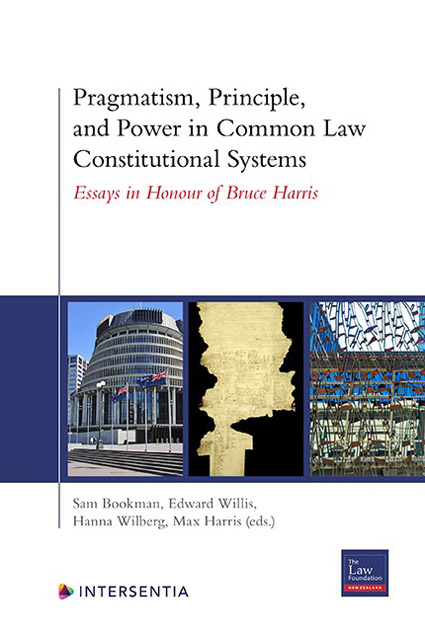 Pragmatism, Principle, and Power in Common Law Constitutional Systems
Pragmatism, Principle, and Power in Common Law Constitutional Systems Book contents
- Frontmatter
- Foreword
- Preface
- Contents
- The Writings of Professor Bruce Harris
- List of Cases
- List of Contributors
- Introduction
- Part I The Nature of Executive Power
- Part II Issues Concerning The Judiciary: The Nature of Judicial (and Executive) Power
- Part III Issues Concerning The Judiciary: Creativity and Pragmatism in Judicial Method
- Part IV Issues Concerning The Judiciary: Judicial Appointment and Accountability
- Part III The Nature of Unwritten Constitutions and Their Future
- Index
Constitutional Scholars and the Unwritten Constitution: Interpreters, Reformers, Communicators
Published online by Cambridge University Press: 19 November 2022
- Frontmatter
- Foreword
- Preface
- Contents
- The Writings of Professor Bruce Harris
- List of Cases
- List of Contributors
- Introduction
- Part I The Nature of Executive Power
- Part II Issues Concerning The Judiciary: The Nature of Judicial (and Executive) Power
- Part III Issues Concerning The Judiciary: Creativity and Pragmatism in Judicial Method
- Part IV Issues Concerning The Judiciary: Judicial Appointment and Accountability
- Part III The Nature of Unwritten Constitutions and Their Future
- Index
Summary
INTRODUCTION
One of the hallmarks of the ‘unwritten’ constitution is its resistance to precise definition. The unwritten constitution is sometimes ascribed an almost esoteric quality, divinable only to a priestly caste of experts. Sir Geoffrey Palmer has compared New Zealand's constitution to the elusive ‘Snark’ in Lewis Carroll's nonsense poem, The Hunting of the Snark: constitutional interpretation is like searching for a monster that is both elusive and imaginary. Whatever its merits, the unwritten constitution poses difficulties in matters of academic interpretation, practical application and education.
Enter Bruce Harris. In a vast and distinguished body of work, his latest contribution may be his most impactful. In New Zealand Constitution: An Analysis in Terms of Principles, Professor Harris offers a summary of the New Zealand constitution that is remarkable in its simplicity and readability. The text's central conceit is that the New Zealand constitution can be succinctly systematised in 16 principles, each of which is neatly set out and analysed. The book provides a uniquely accessible advanced introduction to the New Zealand constitution. But it is more than a restatement. It is simultaneously an interpretation of New Zealand's constitutional arrangements; a prescription for reform ; and an educational tool.
Efforts such as Harris's New Zealand Constitution raise questions about the role that scholars play in New Zealand's constitutional arrangements. This contribution argues that the academy is part of the interpretive community which produces New Zealand's constitution. Yet the constitutional role of academics has seldom been examined. In Section 2, I make the case for treatment of the academy as a constitutional institution. In doing so, I draw on recent scholarly analysis which recognises the constitutional role of public officials, integrity agencies and ‘knowledge institutions’. In Section 3, I set out the constitutional functions carried out by law teachers. Academics perform three functions: interpretive/descriptive, evaluative/normative and educational/communicational. Different academic roles and strategies can be assumed within these functions. For example, the evaluative/normative function could involve radical critique and deconstruction, challenging the very foundations of public law or the postcolonial liberal state; from this standpoint, a scholar may prescribe transformational change, or adopt the role of an external critic.
- Type
- Chapter
- Information
- Pragmatism, Principle, and Power in Common Law Constitutional SystemsEssays in Honour of Bruce Harris, pp. 289 - 320Publisher: IntersentiaPrint publication year: 2022
